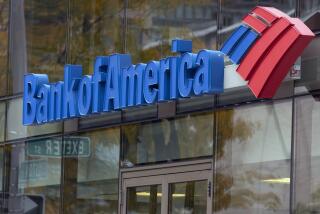Surprise BofA Losses Trigger Plunge in Stock
- Share via
What a way to start a marriage.
The new BankAmerica Corp., the merged entity of the old BankAmerica and NationsBank Corp., stunned Wall Street on Wednesday by reporting third-quarter earnings well below expectations--in part because of a huge loss related to a hedge fund investment.
The news sent shares of the nation’s largest bank plunging $5.88 to $48.06 on the New York Stock Exchange and immediately raised questions about the future of the California management contingent in the new bank.
While the old BankAmerica was based in San Francisco, the headquarters of the new bank is in Charlotte, N.C., NationsBank’s base. David Coulter, CEO of the old BankAmerica, is president of the new bank and had been considered a potential heir to the new bank’s CEO, Hugh McColl, the tough-minded manager who built NationsBank.
But Coulter, 50, engineered the old BofA’s 1997 decision to lend $1.4 billion--unsecured--to D.E. Shaw & Co., a New York-based hedge fund. That high-risk move blew up in the third quarter, as wild swings in markets worldwide caused severe trading losses for many such hedge funds with large, leveraged bets on stocks and bonds.
BofA said Wednesday it took a $372-million write-down against its D.E. Shaw loan. Perhaps more significant, the bank announced that it will buy and oversee the liquidation of a $20-billion hedged bond portfolio D.E. Shaw had built with help from BofA’s loan.
That portfolio includes about $10 billion in U.S. Treasury securities and more than $4 billion in Japanese bonds. Bob Stickler, a BofA spokesman, said the bank, in assuming direct control of the portfolio, “has the ability to ride it out,” meaning it won’t be compelled to dump securities in an already jittery market.
What BofA is doing, effectively, is trying to save its remaining D.E. Shaw investment by rescuing the portfolio, in the same way that a consortium of 14 major banks and brokerages recently put up $3.6 billion to rescue the portfolio of Long-Term Capital Management, a Greenwich, Conn.-based hedge fund that came perilously close to failing three weeks ago because of trading bets gone bad.
And as in the case of Long-Term Capital, BofA’s ultimate losses with the bond portfolio aren’t known. That will depend on market conditions in coming months.
In the big picture, BofA’s announcement indicates that the troubles of hedge funds--until recently a secretive group of investment funds trading aggressively worldwide with money from institutions and wealthy individuals--haven’t yet been fully exposed.
A spokesman for D.E. Shaw, founded by computer scientist David Shaw, insisted that despite taking some losses, “we’re not going down the tubes.”
BofA certainly isn’t financially threatened by the hits it has taken. The company, which also Wednesday disclosed an additional $400 million exposure (“substantially collateralized”) to hedge funds besides D.E. Shaw, had total capital of $47.3 billion at Sept. 30, or 8% of its total assets of $600 billion.
But BofA’s problems in the third quarter extended beyond its hedge fund losses. The company lost $529 million trading securities for its own account, including $238 million in Russian bond losses and $196 million in corporate bond losses.
After accounting for trading losses, the bank’s net income from continuing operations was $893 million, or 50 cents a diluted share, in the quarter, down from $1.77 billion, or 99 cents a share in the same period last year (assuming the two banks had been one).
Wall Street analysts had expected earnings of 90 cents a share.
Net income, after merger-related charges and the D.E. Shaw write-off, was reduced to $374 million, or 21 cents a share.
Of the $529-million trading loss, 75% was lost at the hands of the old BofA’s trading unit. NationsBank’s trading unit lost the rest.
Wall Street analysts immediately focused on Coulter’s team and questioned the old bank’s risk management controls--or lack thereof. “We have serious concerns over the risk management practices of BankAmerica,” said Thomas Hanley, analyst at Warburg Dillon Read in New York. He lowered his rating on the stock to “reduce” from “strong buy.”
Richard Bove, analyst at Raymond James & Associates, said he expects “a drain on earnings for an extended period, maybe 12 to 18 months” from trading losses and merger costs. “I wouldn’t touch the stock” at current prices, he added.
Hanley slashed his 1999 earnings estimate for the bank to $4.90 a share from $5.45.
Still, analysts noted that it isn’t surprising that BofA--like most major banks and brokerages--has lost money trading securities in recent months, given the nearly unprecedented volatility in global markets. What’s more, the old BofA, operating globally, would have been expected to take more risk than NationsBank, with its primarily domestic focus.
Even so, “The test of a lot of these operations is markets like these,” said Michael Mayo, bank analyst at CS First Boston.
And inevitably when losses pile up, whether justifiable or not, someone inevitably takes the heat.
Case in point: Merrill Lynch & Co. asked Daniel T. Napoli, the executive in charge of overseeing the giant brokerage’s risks around the world, to step down and take another position. Merrill’s trading losses last quarter helped put it in the red for the first time since 1989.
At BofA, the finger now will be pointing at Coulter and his San Francisco team, which runs the bank’s wholesale banking unit.
From the day the BofA/NationsBank merger was announced, analysts speculated that the California management team would eventually be shoved aside in favor of the Charlotte team.
Now, the third-quarter losses “give the NationsBank guys a tremendous upper hand,” Bove said. “They brought a clean bank to the deal, and BofA didn’t.”
*
Tom Petruno can be reached by e-mail at tom.petruno@latimes.com.
More to Read
Inside the business of entertainment
The Wide Shot brings you news, analysis and insights on everything from streaming wars to production — and what it all means for the future.
You may occasionally receive promotional content from the Los Angeles Times.










